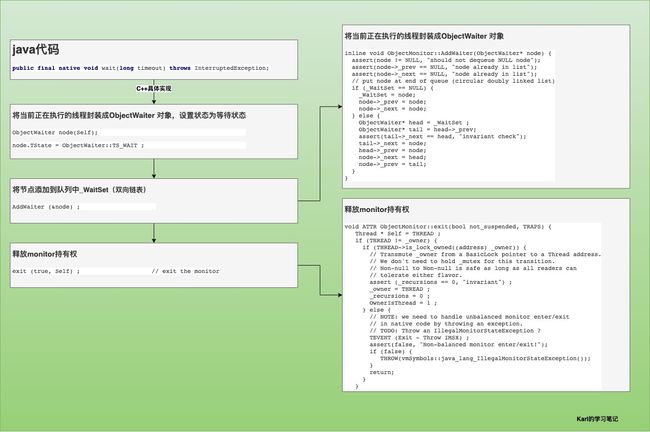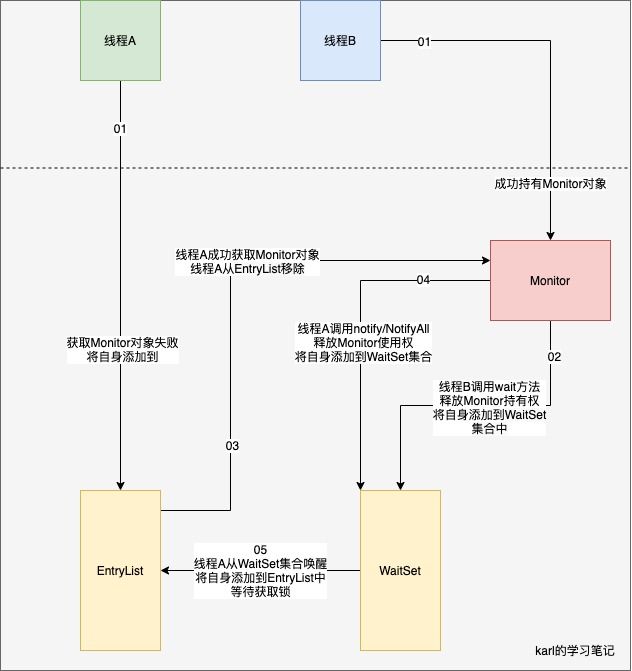通过openjdk源码分析ObjectMonitor底层实现
- Hotspot JDK只是部分开源,将底层的调用C++的native方法的具体实现屏蔽了,而openjdk则将这部分也开源了,接下来我们通过openjdk源码分析ObjectMonitor底层实现。
- openjdk 的官方地址为: https://openjdk.java.net/
- 源码地址: https://hg.openjdk.java.net/jdk8u/jdk8u/hotspot/file
源码分析
ObjectMonitor.Hpp
- 头文件,主要定义一些变量
- 地址:https://hg.openjdk.java.net/jdk8u/jdk8u/hotspot/file/d975dfffada6/src/share/vm/runtime/objectMonitor.hpp
- 源码
/*
* Copyright (c) 1998, 2013, Oracle and/or its affiliates. All rights reserved.
* DO NOT ALTER OR REMOVE COPYRIGHT NOTICES OR THIS FILE HEADER.
*
* This code is free software; you can redistribute it and/or modify it
* under the terms of the GNU General Public License version 2 only, as
* published by the Free Software Foundation.
*
* This code is distributed in the hope that it will be useful, but WITHOUT
* ANY WARRANTY; without even the implied warranty of MERCHANTABILITY or
* FITNESS FOR A PARTICULAR PURPOSE. See the GNU General Public License
* version 2 for more details (a copy is included in the LICENSE file that
* accompanied this code).
*
* You should have received a copy of the GNU General Public License version
* 2 along with this work; if not, write to the Free Software Foundation,
* Inc., 51 Franklin St, Fifth Floor, Boston, MA 02110-1301 USA.
*
* Please contact Oracle, 500 Oracle Parkway, Redwood Shores, CA 94065 USA
* or visit www.oracle.com if you need additional information or have any
* questions.
*
*/
#ifndef SHARE_VM_RUNTIME_OBJECTMONITOR_HPP
#define SHARE_VM_RUNTIME_OBJECTMONITOR_HPP
#include "runtime/os.hpp"
#include "runtime/park.hpp"
#include "runtime/perfData.hpp"
// ObjectWaiter serves as a "proxy" or surrogate thread.
// TODO-FIXME: Eliminate ObjectWaiter and use the thread-specific
// ParkEvent instead. Beware, however, that the JVMTI code
// knows about ObjectWaiters, so we'll have to reconcile that code.
// See next_waiter(), first_waiter(), etc.
// ObjectWaiter 顾名思义对象等待着
// ObjectWaiter 一个线程尝试获取monitor锁失败后,最终会被封装成一个ObjectWaiter对象 封装的是一个线程
// ObjectWaiter 类似一个双向链表
class ObjectWaiter : public StackObj {
public:
enum TStates { TS_UNDEF, TS_READY, TS_RUN, TS_WAIT, TS_ENTER, TS_CXQ } ;
enum Sorted { PREPEND, APPEND, SORTED } ;
ObjectWaiter * volatile _next; // 上一个 ObjectWaiter
ObjectWaiter * volatile _prev; // 下一个 ObjectWaiter
Thread* _thread; // 线程
jlong _notifier_tid;
ParkEvent * _event;
volatile int _notified ;
volatile TStates TState ;
Sorted _Sorted ; // List placement disposition
bool _active ; // Contention monitoring is enabled
public:
ObjectWaiter(Thread* thread);
void wait_reenter_begin(ObjectMonitor *mon);
void wait_reenter_end(ObjectMonitor *mon);
};
// forward declaration to avoid include tracing.hpp
class EventJavaMonitorWait;
// WARNING:
// This is a very sensitive and fragile class. DO NOT make any
// change unless you are fully aware of the underlying semantics.
// This class can not inherit from any other class, because I have
// to let the displaced header be the very first word. Otherwise I
// have to let markOop include this file, which would export the
// monitor data structure to everywhere.
//
// The ObjectMonitor class is used to implement JavaMonitors which have
// transformed from the lightweight structure of the thread stack to a
// heavy weight lock due to contention
// It is also used as RawMonitor by the JVMTI
// ObjectMonitor 就是我们常说的monitor对象
class ObjectMonitor {
public:
// 异常枚举
enum {
OM_OK, // no error
OM_SYSTEM_ERROR, // operating system error
OM_ILLEGAL_MONITOR_STATE, // IllegalMonitorStateException
OM_INTERRUPTED, // Thread.interrupt()
OM_TIMED_OUT // Object.wait() timed out
};
public:
// TODO-FIXME: the "offset" routines should return a type of off_t instead of int ...
// ByteSize would also be an appropriate type.
static int header_offset_in_bytes() { return offset_of(ObjectMonitor, _header); }
static int object_offset_in_bytes() { return offset_of(ObjectMonitor, _object); }
static int owner_offset_in_bytes() { return offset_of(ObjectMonitor, _owner); }
static int count_offset_in_bytes() { return offset_of(ObjectMonitor, _count); }
static int recursions_offset_in_bytes() { return offset_of(ObjectMonitor, _recursions); }
static int cxq_offset_in_bytes() { return offset_of(ObjectMonitor, _cxq) ; }
static int succ_offset_in_bytes() { return offset_of(ObjectMonitor, _succ) ; }
static int EntryList_offset_in_bytes() { return offset_of(ObjectMonitor, _EntryList); }
static int FreeNext_offset_in_bytes() { return offset_of(ObjectMonitor, FreeNext); }
static int WaitSet_offset_in_bytes() { return offset_of(ObjectMonitor, _WaitSet) ; }
static int Responsible_offset_in_bytes() { return offset_of(ObjectMonitor, _Responsible);}
static int Spinner_offset_in_bytes() { return offset_of(ObjectMonitor, _Spinner); }
public:
// Eventaully we'll make provisions for multiple callbacks, but
// now one will suffice.
static int (*SpinCallbackFunction)(intptr_t, int) ;
static intptr_t SpinCallbackArgument ;
public:
markOop header() const;
void set_header(markOop hdr);
intptr_t is_busy() const {
// TODO-FIXME: merge _count and _waiters.
// TODO-FIXME: assert _owner == null implies _recursions = 0
// TODO-FIXME: assert _WaitSet != null implies _count > 0
return _count|_waiters|intptr_t(_owner)|intptr_t(_cxq)|intptr_t(_EntryList ) ;
}
intptr_t is_entered(Thread* current) const;
void* owner() const;
void set_owner(void* owner);
intptr_t waiters() const;
intptr_t count() const;
void set_count(intptr_t count);
intptr_t contentions() const ;
intptr_t recursions() const { return _recursions; }
// JVM/DI GetMonitorInfo() needs this
ObjectWaiter* first_waiter() { return _WaitSet; }
ObjectWaiter* next_waiter(ObjectWaiter* o) { return o->_next; }
Thread* thread_of_waiter(ObjectWaiter* o) { return o->_thread; }
// initialize the monitor, exception the semaphore, all other fields
// are simple integers or pointers
ObjectMonitor() {
//成员变量的初始化
_header = NULL;
_count = 0;
_waiters = 0,
//定义 volatile intptr_t _recursions; // recursion count, 0 for first entry 递归/嵌套的数量 第一次为0
// 作用与可重入锁
_recursions = 0;
_object = NULL;
// 定义 void * volatile _owner; // pointer to owning thread OR BasicLock
// 就是持有当地对象monitor线程
_owner = NULL;
// 等待集合 定义 ObjectWaiter * volatile _WaitSet; 其中的元素就是上述 ObjectWaiter
// 配合 wait和Notify/notifyALl 使用
_WaitSet = NULL;
// 定义 volatile int _WaitSetLock; // protects Wait Queue - simple spinlock
// 保护等待队列 作用与自旋锁
_WaitSetLock = 0 ;
_Responsible = NULL ;
_succ = NULL ;
// 定义 ObjectWaiter * volatile _cxq ;
// LL of recently-arrived threads blocked on entry.
// The list is actually composed of WaitNodes, acting
// as proxies for Threads.
// 是一个列表 其元素也是 ObjectWaiter
//
_cxq = NULL ;
FreeNext = NULL ;
//阻塞队列 _EntryList 定义 ObjectWaiter * volatile _EntryList ; 其中的元素就是上述 ObjectWaiter
// 阻塞队列 配合synchronized锁进行使用
_EntryList = NULL ;
_SpinFreq = 0 ;
_SpinClock = 0 ;
OwnerIsThread = 0 ;
_previous_owner_tid = 0;
}
~ObjectMonitor() {
// TODO: Add asserts ...
// _cxq == 0 _succ == NULL _owner == NULL _waiters == 0
// _count == 0 _EntryList == NULL etc
}
private:
void Recycle () {
// TODO: add stronger asserts ...
// _cxq == 0 _succ == NULL _owner == NULL _waiters == 0
// _count == 0 EntryList == NULL
// _recursions == 0 _WaitSet == NULL
// TODO: assert (is_busy()|_recursions) == 0
_succ = NULL ;
_EntryList = NULL ;
_cxq = NULL ;
_WaitSet = NULL ;
_recursions = 0 ;
_SpinFreq = 0 ;
_SpinClock = 0 ;
OwnerIsThread = 0 ;
}
public:
void* object() const;
void* object_addr();
void set_object(void* obj);
bool check(TRAPS); // true if the thread owns the monitor.
void check_slow(TRAPS);
void clear();
static void sanity_checks(); // public for -XX:+ExecuteInternalVMTests
// in PRODUCT for -XX:SyncKnobs=Verbose=1
#ifndef PRODUCT
void verify();
void print();
#endif
bool try_enter (TRAPS) ;
void enter(TRAPS);
void exit(bool not_suspended, TRAPS);
void wait(jlong millis, bool interruptable, TRAPS);
void notify(TRAPS);
void notifyAll(TRAPS);
// Use the following at your own risk
intptr_t complete_exit(TRAPS);
void reenter(intptr_t recursions, TRAPS);
private:
void AddWaiter (ObjectWaiter * waiter) ;
static void DeferredInitialize();
ObjectWaiter * DequeueWaiter () ;
void DequeueSpecificWaiter (ObjectWaiter * waiter) ;
void EnterI (TRAPS) ;
void ReenterI (Thread * Self, ObjectWaiter * SelfNode) ;
void UnlinkAfterAcquire (Thread * Self, ObjectWaiter * SelfNode) ;
int TryLock (Thread * Self) ;
int NotRunnable (Thread * Self, Thread * Owner) ;
int TrySpin_Fixed (Thread * Self) ;
int TrySpin_VaryFrequency (Thread * Self) ;
int TrySpin_VaryDuration (Thread * Self) ;
void ctAsserts () ;
void ExitEpilog (Thread * Self, ObjectWaiter * Wakee) ;
bool ExitSuspendEquivalent (JavaThread * Self) ;
void post_monitor_wait_event(EventJavaMonitorWait * event,
jlong notifier_tid,
jlong timeout,
bool timedout);
private:
friend class ObjectSynchronizer;
friend class ObjectWaiter;
friend class VMStructs;
// WARNING: this must be the very first word of ObjectMonitor
// This means this class can't use any virtual member functions.
volatile markOop _header; // displaced object header word - mark
void* volatile _object; // backward object pointer - strong root
double SharingPad [1] ; // temp to reduce false sharing
// All the following fields must be machine word aligned
// The VM assumes write ordering wrt these fields, which can be
// read from other threads.
protected: // protected for jvmtiRawMonitor
void * volatile _owner; // pointer to owning thread OR BasicLock
volatile jlong _previous_owner_tid; // thread id of the previous owner of the monitor
volatile intptr_t _recursions; // recursion count, 0 for first entry
private:
int OwnerIsThread ; // _owner is (Thread *) vs SP/BasicLock
ObjectWaiter * volatile _cxq ; // LL of recently-arrived threads blocked on entry.
// The list is actually composed of WaitNodes, acting
// as proxies for Threads.
protected:
ObjectWaiter * volatile _EntryList ; // Threads blocked on entry or reentry.
private:
Thread * volatile _succ ; // Heir presumptive thread - used for futile wakeup throttling
Thread * volatile _Responsible ;
int _PromptDrain ; // rqst to drain cxq into EntryList ASAP
volatile int _Spinner ; // for exit->spinner handoff optimization
volatile int _SpinFreq ; // Spin 1-out-of-N attempts: success rate
volatile int _SpinClock ;
volatile int _SpinDuration ;
volatile intptr_t _SpinState ; // MCS/CLH list of spinners
// TODO-FIXME: _count, _waiters and _recursions should be of
// type int, or int32_t but not intptr_t. There's no reason
// to use 64-bit fields for these variables on a 64-bit JVM.
volatile intptr_t _count; // reference count to prevent reclaimation/deflation
// at stop-the-world time. See deflate_idle_monitors().
// _count is approximately |_WaitSet| + |_EntryList|
protected:
volatile intptr_t _waiters; // number of waiting threads
private:
protected:
// 等待集合 其中的元素就是 ObjectWaiter
ObjectWaiter * volatile _WaitSet; // LL of threads wait()ing on the monitor
private:
volatile int _WaitSetLock; // protects Wait Queue - simple spinlock
public:
int _QMix ; // Mixed prepend queue discipline
ObjectMonitor * FreeNext ; // Free list linkage
intptr_t StatA, StatsB ;
public:
static void Initialize () ;
static PerfCounter * _sync_ContendedLockAttempts ;
static PerfCounter * _sync_FutileWakeups ;
static PerfCounter * _sync_Parks ;
static PerfCounter * _sync_EmptyNotifications ;
static PerfCounter * _sync_Notifications ;
static PerfCounter * _sync_SlowEnter ;
static PerfCounter * _sync_SlowExit ;
static PerfCounter * _sync_SlowNotify ;
static PerfCounter * _sync_SlowNotifyAll ;
static PerfCounter * _sync_FailedSpins ;
static PerfCounter * _sync_SuccessfulSpins ;
static PerfCounter * _sync_PrivateA ;
static PerfCounter * _sync_PrivateB ;
static PerfCounter * _sync_MonInCirculation ;
static PerfCounter * _sync_MonScavenged ;
static PerfCounter * _sync_Inflations ;
static PerfCounter * _sync_Deflations ;
static PerfLongVariable * _sync_MonExtant ;
public:
static int Knob_Verbose;
static int Knob_SpinLimit;
void* operator new (size_t size) throw() {
return AllocateHeap(size, mtInternal);
}
void* operator new[] (size_t size) throw() {
return operator new (size);
}
void operator delete(void* p) {
FreeHeap(p, mtInternal);
}
void operator delete[] (void *p) {
operator delete(p);
}
};
#undef TEVENT
#define TEVENT(nom) {if (SyncVerbose) FEVENT(nom); }
#define FEVENT(nom) { static volatile int ctr = 0 ; int v = ++ctr ; if ((v & (v-1)) == 0) { ::printf (#nom " : %d \n", v); ::fflush(stdout); }}
#undef TEVENT
#define TEVENT(nom) {;}
#endif // SHARE_VM_RUNTIME_OBJECTMONITOR_HPP
- 上述主要定义了一下变量 ,我们通过注释我们可以对ObjectMonitor ,_WaitSet,_EntryList等有一定的了解,下面我们看具体的实现。
ObjectMonitor.Cpp
- 具体的实现代码,
- 源码地址为:https://hg.openjdk.java.net/jdk8u/jdk8u/hotspot/file/d975dfffada6/src/share/vm/runtime/objectMonitor.cpp
- 由于源代码比较多,我们就从wait和notify的具体实现来入手如下图所示:


- 我们在用一张图来讲解一下_WaitSet和_EntryList 的关系



